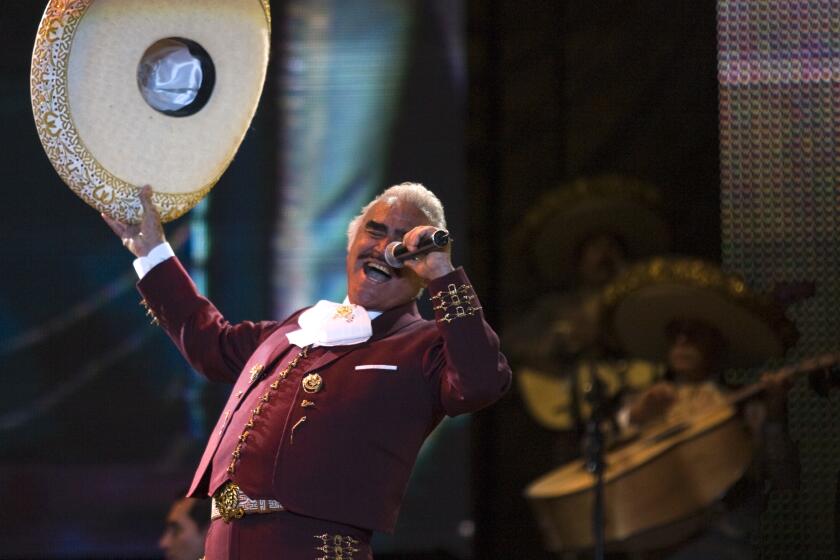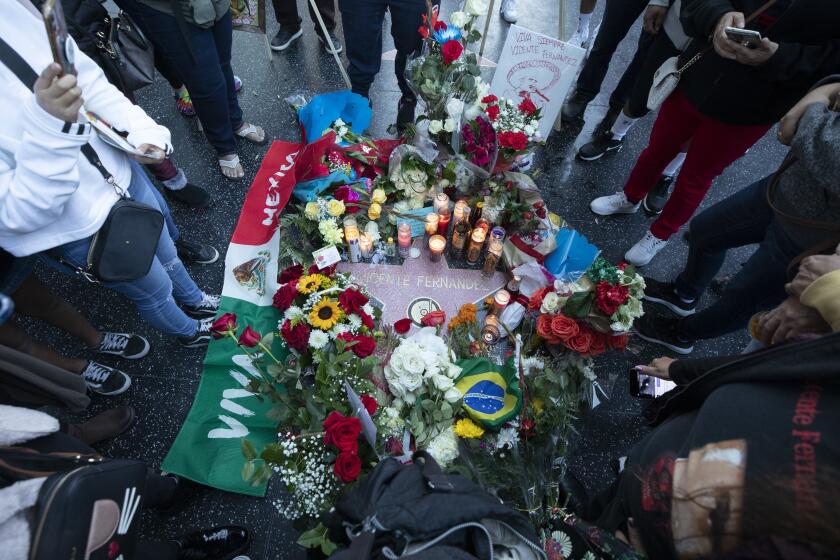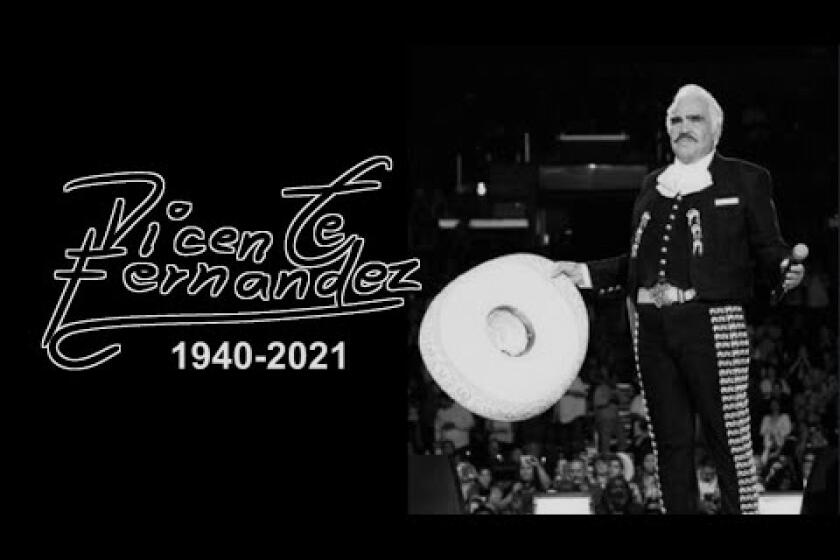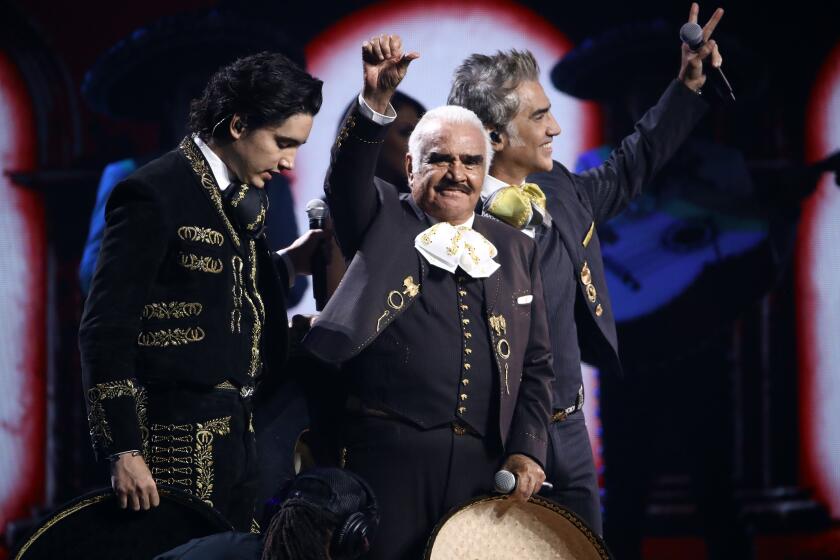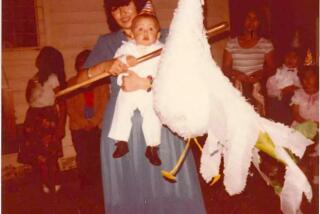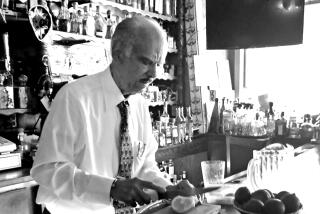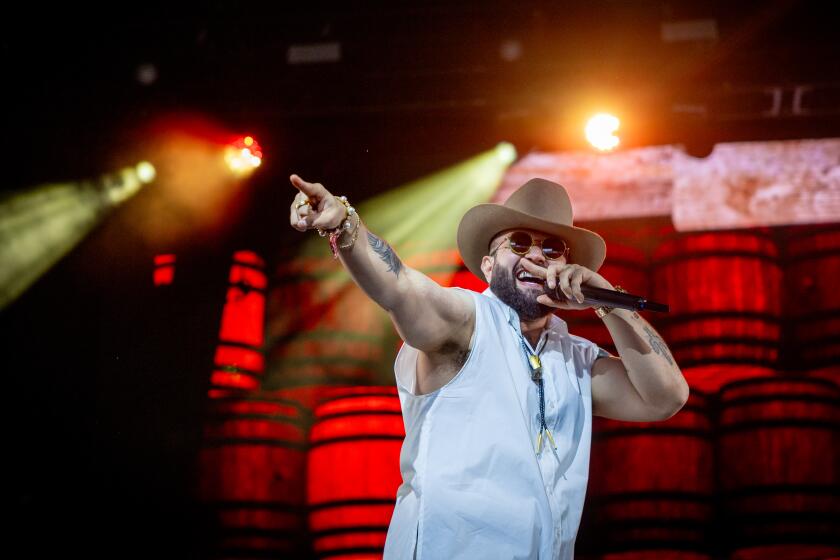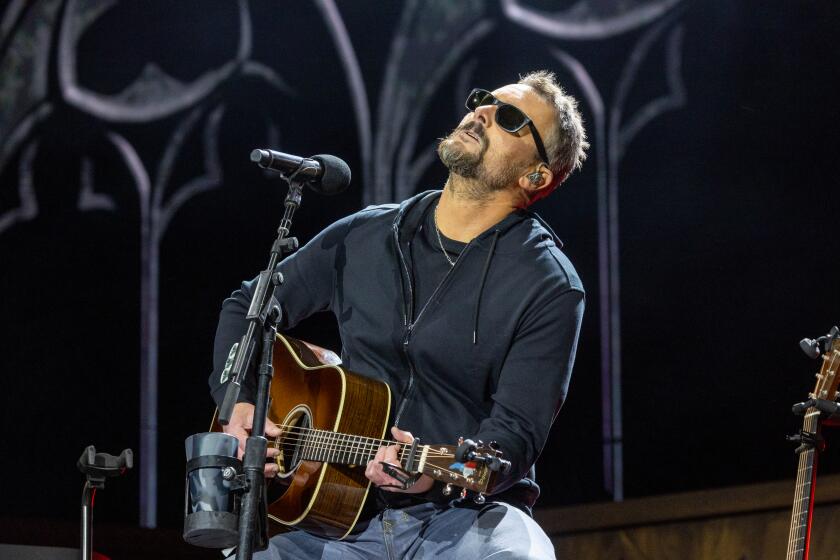Vicente Fernández, a Mexican musical icon for generations, dies at 81

Mexican singer Vicente Fernandez performs at AmericanAirlines Arena on October 10, 2010 in Miami, Florida. (Photo by Olivia Salazar/WireImage)
Vicente Fernández’s romantic rancheras and timeless folk anthems defined the grit and romance of his turbulent homeland, songs of love, heartbreak and working-class heroes that made him a cultural giant for generations of fans throughout Latin America and beyond.
With his buttery baritone and ornate sombreros, embroidered jackets and slim trousers, he stood as a constant for decades, a source of comfort in good times and bad.
But time finally caught up with a performer who seemed eternal.
In poor health in recent months, Fernández died Sunday at 81, according to an announcement on his Instagram page. A cause of death was not specified.
At the singer’s palatial ranch near Guadalajara, mourners and mariachis gathered to belt out his songs and place flowers outside the stately brick entrance gate Sunday. In other parts of the country, fans blasted his music from their cars and wept openly in the streets.
“I cried,” said Rosa María Hernández, a 40-year-old homemaker in Mexico City. Every member of her family, from her children to her 89-year-old grandmother, are fans of Fernández, she said. “We’re all in pain. Vicente Fernández was one of the greatest artists God gave to Mexico.”
Mexican music icon Vicente Fernández was more than just a singer to his fans in the U.S. He was them
Armando López Estrada, an architect in Mexico City, echoed the sentiment.
“His songs have accompanied me in all my joys and my sorrows,” he said. “Mexico and the world will miss him.”
On Twitter, President Andrés Manuel Lopez Obrador described Fernández as “a symbol of the ranchera song of our time, known and recognized in Mexico and abroad.”
Fernández, who performed his final live show at Mexico City’s Azteca Stadium in 2016, had a variety of health ailments in recent years, including liver and prostate cancer. In 2013, he was forced to cut short his farewell tour after being hospitalized with a pulmonary embolism. On numerous occasions, fictional reports of his death surfaced on the internet, leading the singer at one point to release a video in which he humorously declared, “When I die, I’ll let you know.”
They blared his songs from speakers in homes and cars and at shops and restaurants. Mourners piled flowers and candles around his star at the Hollywood Walk of Fame.
During a career that began on the street corners of Guadalajara, the self-taught troubadour recorded more than 50 albums, all in Spanish, and sold tens of millions of copies, nearly half in the United States. He toured relentlessly, created the themes for wildly popular telenovelas and starred in more than two dozen movies throughout the ’70s and ’80s.
In 1998, he received a star on the Hollywood Walk of Fame — his greatest prize, he once said, because he considered it a gift from his fans. But as late as 2016, the inveterate performer was still drawing accolades: Fernández took home the Grammy Award for regional Mexican album for the live recording of his final show, titled “Un Azteca en el Azteca” (“An Aztec at the Aztec”).

Blessed with an operatic voice and a stately sense of showmanship, Fernández was renowned for blending musical virtuosity with heartthrob theatrics, folkloric traditions with mass-market appeal. He was widely viewed as the last of a breed, the final entry in Mexico’s pantheon of crooning matinee idols. His nicknames were appropriately epic: El Número Uno, the People’s Son, the King of Mexican Song. But to his legions of fans, he was “Chente” — short for Vicente — a presence so ubiquitous and long-running, he could, like a member of the family, be invoked with a simple nickname.
In fact, Fernández, decked out in his embroidered ensembles, complete with engraved, gold-plated pistol, served as the embodiment of Mexico itself — at least an older, idealized Mexico. Backed by a full mariachi band, he sang of ranches and cantinas, honor and patriotism, saluting those who were penniless but happy, heartbroken yet proud.
As Fernández approached his prime, however, the Mexico he represented began to unravel. The 1990s brought the North American Free Trade Agreement, the Zapatistas and a parade of horrors beginning with the narco wars. Globalization was reshaping the music industry; Mexican radio came to feature more American top 40 than ranchera, the rural ballads that were Fernández’s bread and butter.
Rather than embrace contemporary styles, Fernández dug in his heels.
“When you’re a ranchera singer, you represent your country,” he once told The Times. “It’s a God-given gift.”
Fernández’s most significant feat may be that he managed to stay relevant, preserving a vernacular genre without being reduced to a novelty act. He seemed to reintroduce himself to a new generation every decade while never straying from the fans who made him a titan.
“The way people look at Vicente, he’s part of their identity: As long as he’s OK, they’re OK,” his record promoter, Sony Discos Vice President Jose Rosario, said at the time.
“Lamentamos comunicarles su deceso el día domingo 12 de diciembre a las 6:15 am. (Hora de México).
That role would get its greatest test in 1998, when kidnappers ambushed Fernández’s eldest son and namesake, 33-year-old Vicente Jr., as he left his father’s ranch on the outskirts of Guadalajara. For nearly four months, they held him hostage. Their demands spiraled into the millions. To pressure Fernández, they chopped off two of Vicente Jr.’s fingers.
Although he was distraught, Fernández kept the ordeal secret. He refused to file a police report or cancel any concerts. In part, it was a pragmatic move; the kidnappers had warned him to not make trouble. But Fernández had his own reasons for wanting the show to go on. He was the quintessential old-school performer, an entertainer who lived to sing and sang to live.
Only after Vicente Jr. was freed — unharmed but for his fingers — did Fernández publicly reveal what had happened. Despite the tragedy, he remained fiercely devoted to his native land. “I will not leave Mexico,” he told the Televisa network at the time. “From my country, they will only take me out feet first.”
The story propelled Fernández into U.S. headlines, marking his introduction to many in the English-speaking world. But for millions of Latin Americans — including those living in the United States — Fernández was already a legend on par with the likes of those other mononymous crooners Elvis and Sinatra.
Born Feb. 17, 1940, Vicente Fernández Gomez spent his earliest years in Huentitán El Alto, a rural settlement on the fringes of Guadalajara, where his parents raised cattle. A fifth-grade dropout, the young singer grew up milking cows and birthing calves; as a teenager in Tijuana, he washed dishes, shined shoes, tended bar and laid bricks.
Although he would later become a multimillionaire — with his own Learjet and a swimming pool in the shape of a guitar — Fernández clung to his salt-of-the-earth bona fides. “There are two kinds of people in the world,” he would tell audiences, “the poor rich ones and the rich poor ones.”
The song he considered his most autobiographical — “El Hijo Del Pueblo” (“The People’s Son”), written by legendary singer-songwriter José Alfredo Jiménez — echoed those themes:
It is my pride to have been born in the most humble of neighborhoods,
Far from the bustle and false society.…
I go through life very happy with my poverty
Because I don’t have money, I have a lot of heart.
What made Vicente Fernández so consistently spectacular across four decades? Start with these songs.
Fernández’s musical career began just as humbly, without the benefit of voice lessons or star-making machinery. At 21, he returned to Guadalajara and joined the throng of mariachis in the plaza at San Juan de Dios Church, where he spent two years singing for tips. Later, he graduated to the restaurant circuit, then a slot on a live Opry-like radio show. But when he auditioned for his first record contract, the big Mexico City labels treated him like a rube. “They told me that I should go sell peanuts,” Fernández recalled.
Mexican music, up to that point, had been dominated by a succession of mustachioed cowboys, their roguish charms and silken voices marketed as symbols of national identity: Jiménez, Jorge Negrete, Pedro Infante, Javier Solis. Each died at the height of their careers, and before hitting middle age. It was the loss of Solis — during gallbladder surgery, in 1966 — that opened the door for Fernández; within a week, he got a call from CBS Records. Fernández signed with the label, which later became Sony, the company he remained with his entire career.
He soon gained fame for his dexterous baritone, as thick and pliable as putty. He could wail and whimper, chortle and coo, often dropping his microphone midsong and finishing the verse in a naked roar. Whether performing in a Mexican cockfighting pit or a pricey Vegas lounge, he always began with the same promise: to keep singing as long as his audience kept applauding. Frequently, that would mean a marathon of three or four hours, leaving him bathed in sweat, soaked by kisses and showered with booze.
It was the romantic “Volver, Volver” (“Return, Return”), which he first released in 1972, that launched him to international stardom — a searing ballad of a man who longs to returns to the arms of the woman he loves. The song is now a staple of Latin American song (and drunken late-night revelry), reimagined by myriad mariachi acts, European vocalists and the L.A. band Los Lobos, who included a rocked-out version of the tune on albums and concerts.

Unlike the other ranchera kings — none of whom lived past their 40s — Fernández spent a lifetime atop the throne. Over the course of his career, he won three Grammy Awards and eight Latin Grammys, along with innumerable Mexican and other Latin American honors. In 2002, he was honored as person of the year by the Latin Academy of Recording Arts & Sciences, organizer of the Latin Grammys.
For decades, he reigned as one of the most bankable acts in Los Angeles, selling out a string of shows every year at the Pico Rivera Sports Arena and the Universal Amphitheatre. When his Hollywood star was unveiled, a record 4,500 people turned out.
“He represents the maintenance of a culture, the heart and soul of the masses,” said Steve Loza, a professor of ethnomusicology at UCLA. “You want to feel proud of who you are? You want to tell your kids what it is to be Mexican and never lose it? All you have to do is listen to Vicente.”
Fans have taken to social media to honor Vicente ‘Chente’ Fernández, the 81-year-old Mexican singing legend whose death was announced Sunday.
His most important partner throughout his life was his wife, María del Refugio Abarca Villaseñor, known as Cuquita, the Guadalajaran neighbor whom he married in 1963, and with whom he had four children: Gerardo, Alejandra, Vicente Jr. and Alejandro. The latter two, like their father, became singers — with the handsome, baritone-voiced Alejandro, whose music straddles pop and Mexican traditional styles, achieving a large measure of international stardom. Alejandro, dubbed “El Potrillo,” or the Colt, would often join his father onstage for duets, with the mournful “Perdón,” whose lyrics begged the forgiveness of a beloved, becoming a staple.
To his fans, Fernández sometimes seemed ageless — his thin mustache and long sideburns remaining preternaturally black — but he was keenly aware of time. He retired from the movie business in 1991, mindful that his on-screen magnetism had begun to fade. But he remained a magnetic stage presence until the end, even when his movements were slowed by age, his voice hollowed by time. At his final concert at Azteca Stadium, as was his custom, he held aloft a glass of tequila while belting out “Volver, Volver,” blowing kisses to the ebullient crowd.
Fernández often spoke of wanting his life to end onstage, a sentiment that inspired one of his favorite songs, “Una Noche Como Esta” (“A Night Like This One”):
If singing like this
I have earned your affection,
I would be happy if, singing like this,
One day, I die.
Times columnists Carolina A. Miranda and Gustavo Arellano in Los Angeles and staff writer Kate Linthicum and special correspondent Cecilia Sanchez in Mexico City contributed to this report.
More to Read
The biggest entertainment stories
Get our big stories about Hollywood, film, television, music, arts, culture and more right in your inbox as soon as they publish.
You may occasionally receive promotional content from the Los Angeles Times.
